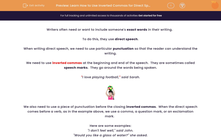Writers often need or want to include someone's exact words in their writing.
To do this, they use direct speech.
When writing direct speech, we need to use particular punctuation so that the reader can understand the writing.
We need to use inverted commas at the beginning and end of the speech. They are sometimes called speech marks. They go around the words being spoken.
"I love playing football," said Sarah.

We also need to use a piece of punctuation before the closing inverted commas. When the direct speech comes before a verb, as in the example above, we use a comma, a question mark, or an exclamation mark.
Here are some examples:
"I don't feel well," said John.
"Would you like a glass of water?" she asked.
"Stop right there!" shouted the police officer.

Sometimes, we may choose to include the direct speech after a verb. For example:
Sarah said, "I love playing football."
In this instance, we need to use a comma before the direct speech begins, and a punctuation mark (full stop, question mark or exclamation mark) before the closing inverted commas. The direct speech must begin with a capital letter.
Here are some more examples:
John said, "I don't feel well."
She asked, "Would you like a glass of water?"
The police officer shouted, "Stop right there!"

In this activity, we will practise identifying the correct use of inverted commas and other punctuation for direct speech.







